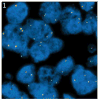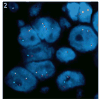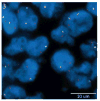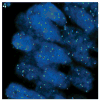Molecular testing guideline for selection of lung cancer patients for EGFR and ALK tyrosine kinase inhibitors: guideline from the College of American Pathologists, International Association for the Study of Lung Cancer, and Association for Molecular Pathology
- PMID: 23551194
- PMCID: PMC4162344
- DOI: 10.5858/arpa.2012-0720-OA
Molecular testing guideline for selection of lung cancer patients for EGFR and ALK tyrosine kinase inhibitors: guideline from the College of American Pathologists, International Association for the Study of Lung Cancer, and Association for Molecular Pathology
Erratum in
- Arch Pathol Lab Med. 2013 Sep;137(9):1174
Abstract
Objective: To establish evidence-based recommendations for the molecular analysis of lung cancers that are required to guide EGFR- and ALK-directed therapies, addressing which patients and samples should be tested, and when and how testing should be performed.
Participants: Three cochairs without conflicts of interest were selected, one from each of the 3 sponsoring professional societies: College of American Pathologists, International Association for the Study of Lung Cancer, and Association for Molecular Pathology. Writing and advisory panels were constituted from additional experts from these societies.
Evidence: Three unbiased literature searches of electronic databases were performed to capture articles published from January 2004 through February 2012, yielding 1533 articles whose abstracts were screened to identify 521 pertinent articles that were then reviewed in detail for their relevance to the recommendations. Evidence was formally graded for each recommendation.
Consensus process: Initial recommendations were formulated by the cochairs and panel members at a public meeting. Each guideline section was assigned to at least 2 panelists. Drafts were circulated to the writing panel (version 1), advisory panel (version 2), and the public (version 3) before submission (version 4).
Conclusions: The 37 guideline items address 14 subjects, including 15 recommendations (evidence grade A/B). The major recommendations are to use testing for EGFR mutations and ALK fusions to guide patient selection for therapy with an epidermal growth factor receptor (EGFR) or anaplastic lymphoma kinase (ALK) inhibitor, respectively, in all patients with advanced-stage adenocarcinoma, regardless of sex, race, smoking history, or other clinical risk factors, and to prioritize EGFR and ALK testing over other molecular predictive tests. As scientific discoveries and clinical practice outpace the completion of randomized clinical trials, evidence-based guidelines developed by expert practitioners are vital for communicating emerging clinical standards. Already, new treatments targeting genetic alterations in other, less common driver oncogenes are being evaluated in lung cancer, and testing for these may be addressed in future versions of these guidelines.
Conflict of interest statement
For author conflict of interest disclosures, see the Appendix.
Figures




Similar articles
-
Molecular testing guideline for selection of lung cancer patients for EGFR and ALK tyrosine kinase inhibitors: guideline from the College of American Pathologists, International Association for the Study of Lung Cancer, and Association for Molecular Pathology.J Thorac Oncol. 2013 Jul;8(7):823-59. doi: 10.1097/JTO.0b013e318290868f. J Thorac Oncol. 2013. PMID: 23552377 Free PMC article.
-
Molecular testing guideline for selection of lung cancer patients for EGFR and ALK tyrosine kinase inhibitors: guideline from the College of American Pathologists, International Association for the Study of Lung Cancer, and Association for Molecular Pathology.J Mol Diagn. 2013 Jul;15(4):415-53. doi: 10.1016/j.jmoldx.2013.03.001. Epub 2013 Apr 4. J Mol Diagn. 2013. PMID: 23562183
-
Updated Molecular Testing Guideline for the Selection of Lung Cancer Patients for Treatment With Targeted Tyrosine Kinase Inhibitors: Guideline From the College of American Pathologists, the International Association for the Study of Lung Cancer, and the Association for Molecular Pathology.J Mol Diagn. 2018 Mar;20(2):129-159. doi: 10.1016/j.jmoldx.2017.11.004. Epub 2018 Jan 23. J Mol Diagn. 2018. PMID: 29398453
-
Management and future directions in non-small cell lung cancer with known activating mutations.Am Soc Clin Oncol Educ Book. 2014:e353-65. doi: 10.14694/EdBook_AM.2014.34.e353. Am Soc Clin Oncol Educ Book. 2014. PMID: 24857124 Review.
-
First-line treatment of advanced epidermal growth factor receptor (EGFR) mutation positive non-squamous non-small cell lung cancer.Cochrane Database Syst Rev. 2016 May 25;(5):CD010383. doi: 10.1002/14651858.CD010383.pub2. Cochrane Database Syst Rev. 2016. Update in: Cochrane Database Syst Rev. 2021 Mar 18;3:CD010383. doi: 10.1002/14651858.CD010383.pub3. PMID: 27223332 Updated. Review.
Cited by
-
Test Feasibility of Next-Generation Sequencing Assays in Clinical Mutation Detection of Small Biopsy and Fine Needle Aspiration Specimens.Am J Clin Pathol. 2016 May;145(5):696-702. doi: 10.1093/ajcp/aqw043. Am J Clin Pathol. 2016. PMID: 27247373 Free PMC article.
-
Morphologic Accuracy in Differentiating Primary Lung Adenocarcinoma From Squamous Cell Carcinoma in Cytology Specimens.Arch Pathol Lab Med. 2016 Oct;140(10):1116-20. doi: 10.5858/arpa.2015-0316-OA. Epub 2016 Aug 23. Arch Pathol Lab Med. 2016. PMID: 27552093 Free PMC article.
-
Adequacy of pleural fluid cytology for comprehensive molecular analysis of lung adenocarcinoma: Experience of a large health-care system.Cytojournal. 2022 Feb 4;19:7. doi: 10.25259/Cytojournal_18_2021. eCollection 2022. Cytojournal. 2022. PMID: 35510120 Free PMC article.
-
Compromised Outcomes in Stage IV Non-Small-Cell Lung Cancer With Actionable Mutations Initially Treated Without Tyrosine Kinase Inhibitors: A Retrospective Analysis of Real-World Data.JCO Oncol Pract. 2024 Jan;20(1):145-153. doi: 10.1200/OP.22.00611. Epub 2023 Aug 9. JCO Oncol Pract. 2024. PMID: 37556776 Free PMC article.
-
Accurate identification of ALK positive lung carcinoma patients: novel FDA-cleared automated fluorescence in situ hybridization scanning system and ultrasensitive immunohistochemistry.PLoS One. 2014 Sep 23;9(9):e107200. doi: 10.1371/journal.pone.0107200. eCollection 2014. PLoS One. 2014. PMID: 25248157 Free PMC article.
References
-
- World Health Organization. [Accessed October 26, 2012];Cancer fact sheet No. 297. http://www.who.int/mediacentre/factsheets/fs297/en/. Published 2012.
-
- Miller VA, Kris MG, Shah N, et al. Bronchioloalveolar pathologic subtype and smoking history predict sensitivity to gefitinib in advanced non-small-cell lung cancer. J Clin Oncol. 2004;22(6):1103–1109. - PubMed
-
- Garassino MC, Borgonovo K, Rossi A, et al. Biological and clinical features in predicting efficacy of epidermal growth factor receptor tyrosine kinase inhibitors: a systematic review and meta-analysis. Anticancer Res. 2009;29(7):2691–2701. - PubMed
-
- Shepherd FA, Rodrigues Pereira J, Ciuleanu T, et al. Erlotinib in previously treated non-small-cell lung cancer. N Engl J Med. 2005;353(2):123–132. - PubMed
-
- Stinchcombe TE, Socinski MA. Gefitinib in advanced non-small cell lung cancer: does it deserve a second chance? Oncologist. 2008;13(9):933–944. - PubMed
Publication types
MeSH terms
Substances
Grants and funding
LinkOut - more resources
Full Text Sources
Other Literature Sources
Medical
Research Materials
Miscellaneous

